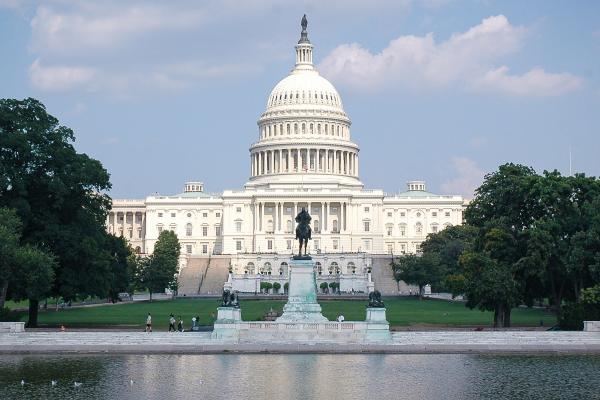Perspectives on Cannabis
130 total results. Page 3 of 6.
Now Financial Businesses can provide their services to licensed cannabis businesses without penalty under California law.
What the new Congress could mean for federal cannabis reform.
Last week, New Jersey Governor Phil Murphy signed three bills that pave the way for legal recreational cannabis sales in New Jersey, after uncertainty swirled around the fate of the legislation even on the day of signing. A clean-up measure reached the governor’s desk only minutes before his signing deadlines.

Arent Fox is monitoring policy changes by the Biden Administration to provide timely analysis on how they could impact your business.
After a shift in political power in Congress and the White House, there are strong indications that the federal prohibition on cannabis in the United States will come to an end.
On February 8, 2021, a wide cross-section of cannabis industry advocates and heavy hitters founded the United States Cannabis Council (“USCC”).
Advertising cannabis products along California’s interstate highways, briefly lived, is now significantly restricted.
All eyes in the cannabis industry will be watching an upcoming case before the Ninth Circuit Court of Appeals that could dramatically ease the tax burden of cannabis entrepreneurs, who pay tax rates many times higher than most non-marijuana businesses.
New Jersey has legalized adult, recreational cannabis use. With more than two-thirds of voters in favor of amending the state Constitution, it became the first in the Tri-State region to permit recreational marijuana use.
In November 2020, Montana joined Arizona, New Jersey, and South Dakota in legalizing recreational cannabis use.
AFC Gamma’s SEC filing illustrates the importance of proper risk assessment and adequate risk factor disclosures to investors in the rapidly-shifting regulatory landscape of cannabis production, sales, and lending.
In our first Cannabis Counsel Cast episode, Partners Emily Leongini and Lynn Fiorentino discuss the potential impact of California’s Prop. 65 on manufacturers, distributors, and sellers of cannabis products, particularly in light of the January 4, 2021 enforcement date for new THC and marijuana smok
To change its method of accounting, a taxpayer must receive consent from the IRS and should provide evidence showing the change in business activity, so that the IRS can confirm that the change in method of accounting will accurately reflect income.
Hemp flower growers and smokable hemp manufacturers impacted by state laws that have banned or restricted smokable hemp flower production and sales are worried that federal regulators could echo state-level restrictions on a national scale.
On November 3, Arizona voters passed the Smart and Safe Arizona Act (Proposition 207) by a wide margin, becoming the 13th state to legalize recreational marijuana for adult use. This is considered a huge victory in the nationwide legalization efforts.
Cannabis and cannabis resin, formerly classified on the most restrictive schedule under the 1961 Single Convention on Narcotic Drugs (Single Convention) were moved to the least restrictive schedule following a historic vote by the UN Commission for Narcotic Drugs on December 2, 2020.

Since California first legalized medical marijuana in 1996, approximately thirty-two other states and the District of Columbia have followed its lead and approved marijuana use for medical purposes.
A potent federal statute designed to take down organized crime looms large over the legal cannabis industry. The Racketeer-Influenced and Corrupt Organizations Act (RICO) was enacted in the 1970s to fight the mob with a declared purpose to “seek eradication of organized crime in the United States.”
Election Day 2020 is around the corner. Today, cannabis use is legal either for medicinal or adult recreational use (or both) in 35 states.
On August 21, 2020, the Drug Enforcement Administration (DEA) published an interim final rule (IFR) to implement hemp-related amendments to the Federal Controlled Substances Act (CSA) that were made by the Agriculture Improvement Act of 2018 (the 2018 Farm Bill).
The United States Trademark Trial and Appeal Board (TTAB) recently affirmed a refusal to register a trademark for “hemp oil extracts” when used as an ingredient in dietary supplements.
Massachusetts retail recreational cannabis establishments reopened on May 25, 2020, for curbside delivery after Governor Charles Baker ordered a phased reopening of state businesses.
The new bill, which follows April 23, 2020 legislation aimed at opening COVID-19 emergency response funding to cannabis businesses, offers a previously unclear path forward for financial services to the cannabis industry by amending the current restrictive regulatory framework on banking.
On April 23, 2019, US Representative Earl Blumenauer (D-OR) introduced HR 6022, the “Emergency Cannabis Small Business Health and Safety Act” in the House Committee on Small Business to extend federal COVID-19 relief to the cannabis industry.
On March 23, 2020, the US Drug Enforcement Administration (DEA) issued a proposed rule that, if finalized, would establish processes by which individuals and entities could apply to DEA to lawfully grow marijuana.